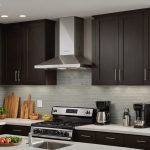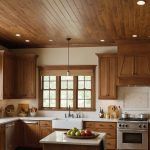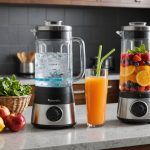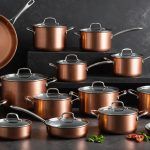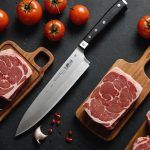Understanding Kitchen Apron Fabrics
The choice of fabric is pivotal in determining the functionality and durability of kitchen aprons. Whether you’re a casual cook or a seasoned chef, selecting the right material can significantly enhance your kitchen experience.
Commonly used kitchen apron fabrics include cotton, polyester, and linen. Each of these materials offers unique characteristics tailored to distinct cooking environments. Cotton is favoured for its softness and breathability, making it comfortable for everyday kitchen use. It’s excellent at absorbing moisture, which helps in managing stains, though it might require more frequent washing to maintain its appearance.
This might interest you : Ultimate tips to reduce noise in your uk kitchen using stylish open shelving solutions
Polyester, on the other hand, is known for its durability and stain resistance. It stands up well to frequent washes and is often more cost-effective, making it a practical choice for both home and professional kitchens.
Linen, while premium, offers natural aesthetics and excellent breathability but requires careful maintenance to retain its look over time.
Also to discover : Pioneering UK Brands Transforming Eco-Friendly Kitchen Textiles: Meet the Industry Trailblazers
Factors influencing fabric durability include the material’s weave, weight, and whether it’s blended with other fibres. Understanding these elements will help you choose a fabric that suits your cooking style and frequency most effectively.
Longevity and Care of Kitchen Apron Fabrics
Maintaining the longevity of kitchen apron fabrics requires understanding their specific care needs. Proper fabric care can extend the life of your aprons, keeping them functional and appealing.
Best Practises for Washing and Maintenance
Different fabrics demand distinct washing methods. Cotton aprons should be washed in cold water to prevent shrinkage and maintain colour. Air drying is preferable to using a dryer, which can fade and distort fabric shape. Polyester is more forgiving, withstanding higher temperatures during washing and drying without significant wear. However, excessive heat can still diminish its durability over time.
Understanding Shrinkage and Fading
Shrinkage is a common issue with cotton fabrics and can impact fit and effectiveness. To mitigate this, avoid hot water and high temperatures when washing. Fading is another issue to consider, particularly with dark and brightly coloured aprons. Ensure consistent colour maintenance by using a gentle detergent and washing similar colours together.
Pre-treatment and Stain Removal
Pre-treatment of stains is crucial for maintaining apron appearance, especially for fabrics prone to permanent spots. Apply stain removal techniques such as soaking in mild detergent before regular washing, ensuring that the fabric remains pristine and ready for use every time.
Practical Use Cases for Different Fabric Types
Practical applications of kitchen aprons vary significantly based on cooking environments. The choice of fabric plays a crucial role in determining the functionality and comfort tailored to these environments. Whether it’s for home cooking or professional settings, selecting the appropriate fabric ensures both practicality and efficiency.
Home Cooking and Casual Use
For home chefs, comfort and ease of maintenance are key factors. Cotton aprons are highly recommended for their breathability and softness, making them ideal for everyday tasks. The fabric’s ability to absorb moisture also aids in managing accidental stains, thus maintaining a clean appearance. It caters well to those who cook casually and prioritize comfort over heavy-duty durability.
Professional Kitchen Settings
In professional kitchens, where durability and fabric durability are paramount, polyester is often the go-to choice. Its stain resistance and resilience to frequent washing make it a practical option for busy chefs who deal with intense cooking environments. Polyester not only withstands the rigors of a demanding kitchen but also balances cost-effectiveness, making it suitable for restaurants and culinary schools.
Recommended Brands and Suppliers in the UK
Navigating the landscape of kitchen apron choices can be simplified by knowing the right brands and suppliers to trust. In the UK, certain names stand out for their quality and durability in apron fabrics. When considering kitchen aprons, it’s essential to choose brands that offer a variety of options tailored to different cooking needs and styles.
Cotton aprons, with their famed breathability and softness, are offered with a touch of style by brands such as Joules and Seasalt Cornwall, known for their reliable and easy-to-maintain designs. For polyester aprons, you might turn to Premier Workwear, a supplier renowned for its sturdy, stain-resistant materials that endure frequent washing and retain a clean appearance.
Elevate your cooking experience with linen aprons from LinenMe or MagicLinen, both of which provide luxurious, natural-looking fabrics perfect for casual or upscale kitchen environments. These suppliers prioritize meticulous craftsmanship, ensuring longevity even with regular use.
Conclusively, by selecting reputable brands and suppliers, you can find aprons that are both practical and stylish, meeting all your kitchen needs without compromising on quality.
Comparing Fabric Choices: Pros and Cons
Navigating the world of kitchen apron fabrics involves understanding their pros and cons to make an informed choice. Each fabric offers distinct advantages and may suit different kitchen environments better.
Cotton vs. Polyester
Cotton’s strength lies in its softness and breathability, which offers incredible comfort, making it a preferred option for those who value a gentle touch against the skin. However, its tendency to shrink and fade might be a downside for those seeking long-term durability.
Polyester shines in its durability and stain resistance, proving a workhorse in professional settings where aprons endure rigorous use. Despite its tougher feel compared to cotton, polyester provides excellent value for money due to its resilience to frequent washing.
When deciding between these, consider the cost vs. comfort trade-offs. Occasional cooks might prefer cotton for comfort, while frequent chefs might find polyester’s durability more beneficial.
Linen vs. Blended Fabrics
Linen offers a luxurious option, prized for its natural look and breathability. However, pure linen demands careful maintenance to keep its premium appearance. Blended fabrics bring together the benefits of multiple materials, often balancing durability and affordability while offering reasonable performance in kitchen settings. For those mindful of budget, blends can serve as a cost-effective alternative, providing a middle ground between all-natural and synthetic options.
Essential Fabrics for Kitchen Aprons
Choosing the right fabric for your kitchen apron is crucial as it affects both comfort and functionality. Let’s explore the essential fabrics you might consider.
Cotton and Its Benefits
Cotton stands out for its unparalleled softness and breathability. This makes it a popular choice for kitchen aprons, particularly for home chefs who prioritize comfort. Its natural fibers absorb moisture effectively, helping with stain management, though it might necessitate more frequent washings to maintain its pristine appearance.
Polyester: A Durable Alternative
Polyester is celebrated for its durability and stain resistance. This makes it an excellent choice for professional kitchens where aprons bear frequent use. While it is tough on stains and wear, polyester also offers cost-effective solutions by blending with other fibers, enhancing its practicality without a significant impact on budget.
Linen: The Premium Choice
Linen provides a touch of luxury with its natural aesthetics and exceptional breathability. It is ideal for those willing to invest time in fabric care, as maintaining its premium look demands careful maintenance tips. For the discerning chef, linen offers both beauty and practicality, enhancing upscale kitchen environments.


